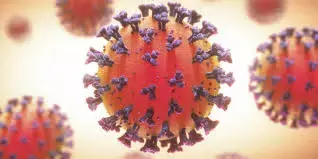- Home
- Medical news & Guidelines
- Anesthesiology
- Cardiology and CTVS
- Critical Care
- Dentistry
- Dermatology
- Diabetes and Endocrinology
- ENT
- Gastroenterology
- Medicine
- Nephrology
- Neurology
- Obstretics-Gynaecology
- Oncology
- Ophthalmology
- Orthopaedics
- Pediatrics-Neonatology
- Psychiatry
- Pulmonology
- Radiology
- Surgery
- Urology
- Laboratory Medicine
- Diet
- Nursing
- Paramedical
- Physiotherapy
- Health news
- Fact Check
- Bone Health Fact Check
- Brain Health Fact Check
- Cancer Related Fact Check
- Child Care Fact Check
- Dental and oral health fact check
- Diabetes and metabolic health fact check
- Diet and Nutrition Fact Check
- Eye and ENT Care Fact Check
- Fitness fact check
- Gut health fact check
- Heart health fact check
- Kidney health fact check
- Medical education fact check
- Men's health fact check
- Respiratory fact check
- Skin and hair care fact check
- Vaccine and Immunization fact check
- Women's health fact check
- AYUSH
- State News
- Andaman and Nicobar Islands
- Andhra Pradesh
- Arunachal Pradesh
- Assam
- Bihar
- Chandigarh
- Chattisgarh
- Dadra and Nagar Haveli
- Daman and Diu
- Delhi
- Goa
- Gujarat
- Haryana
- Himachal Pradesh
- Jammu & Kashmir
- Jharkhand
- Karnataka
- Kerala
- Ladakh
- Lakshadweep
- Madhya Pradesh
- Maharashtra
- Manipur
- Meghalaya
- Mizoram
- Nagaland
- Odisha
- Puducherry
- Punjab
- Rajasthan
- Sikkim
- Tamil Nadu
- Telangana
- Tripura
- Uttar Pradesh
- Uttrakhand
- West Bengal
- Medical Education
- Industry
COVID 19 leading to diabetes in India? Researchers throw light

Maharashtra, India: The researchers from India have found a new trend to be prevalent in India -- coronavirus infection is leading to the onset of diabetes mellitus (DM). The findings of the study are published in the Journal of Postgraduate Medicine.
It is already known that presentation of diabetics with COVID-19 is severe compared to non-DM patients. Diabetic ketoacidosis and severe hyperglycemia are common observation in patients with previous history of diabetes. However, there has been cases whereby the patients without any family history of diabetes, having near normal blood sugar levels experience new-onset hyperglycaemia. This new diabetes onset in COVID-19 patients is experienced globally.
So called "COVID-19 related DM" is a matter of concern during management. Eventually subcutaneous or intravenous insulin is used for achieving normoglycemia during hospitalization. However, COVID-19 related DM may achieve normal blood sugar with insulin as compared to patients with preexisting DM. But the use of associated steroid may complicate the situation.
VK Shivane, AR Lila, and TR Bandgar from Medical College and KEM Hospital, Mumbai, Maharashtra, India, say that there is a need for formulating the registry of "COVID-19 related DM" from various COVID centers and hospitals of India. Also, there is a need to explore whether these patients become permanently diabetic in future or achieve remission.
There has been postulation of various biological mechanisms for the associations and poor outcome of SARS-CoV-2 infection in diabetes:
- Both long-term and short-term hyperglycemia alters chemotaxis, subsequent phagocytosis, and impaired complement fixation.
- DM can lead to proinflammatory state with increased levels of cytokines including interleukin-6 (IL-6) and tumor necrosis factor α (TNF-α), which is associated with multi organ failure in patients with SARS-CoV-2.
- The angiotensin-converting enzyme 2 (ACE2) receptor, the entry point for SARS-CoV-2 into human cells, is up-regulated in patients with DM facilitating the increased opportunity for virus to infect cells.
- It is known that COVID-19 virus can infect endocrine pancreas cells via their expression of ACE2 receptors resulting in impaired insulin secretion making DM worse or new incidences of DM.
- Hyperglycemia increases glucose concentrations in airway secretions making lung cells prone to viral infection and replication.
"COVID-19 pandemic has been a great challenge for developing country like India, in particular, for patients with chronic diseases like DM, HTN, IHD, and COPD. These noncommunicable morbidities form huge socioeconomic burden on the country, especially in such pandemic situations of SARS CoV-2. This pandemic has been a learning lesson for Indian diabetics to achieve a strict glycemic control and hence to prevent short/long term complications of DM including infections. Physicians need to be more vigilant in achieving the target glycemic control and enhance the efforts of patient's awareness toward disease understanding, and management and prevention of complications during this pandemic.," wrote the authors.
"Type 2 diabetic Asian Indians and COVID-19: Lessons learnt so far from the ongoing pandemic," is published in the Journal of Postgraduate Medicine.
Dr Kamal Kant Kohli-MBBS, DTCD- a chest specialist with more than 30 years of practice and a flair for writing clinical articles, Dr Kamal Kant Kohli joined Medical Dialogues as a Chief Editor of Medical News. Besides writing articles, as an editor, he proofreads and verifies all the medical content published on Medical Dialogues including those coming from journals, studies,medical conferences,guidelines etc. Email: drkohli@medicaldialogues.in. Contact no. 011-43720751


